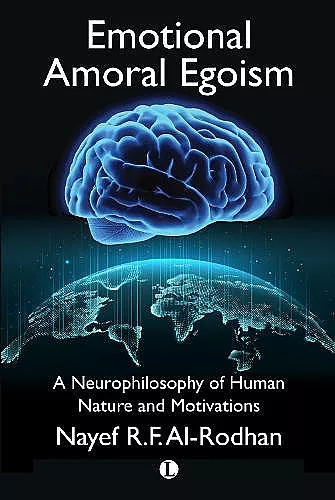Emotional Amoral Egoism
A Neurophilosophy of Human Nature and Motivations
Format:Hardback
Publisher:James Clarke & Co Ltd
Published:30th Sep '21
Currently unavailable, our supplier has not provided us a restock date

This book explores human nature, innate predispositions, and their impact on society. Emotional Amoral Egoism provides insights into governance and human dignity.
In Emotional Amoral Egoism, Professor Nayef Al-Rodhan delves into the complexities of human nature, exploring our innate predispositions and their profound implications for universal security and dignity. The book poses critical questions about the essence of humanity: Are we inherently good or evil? Do we possess true free will? What motivates our actions, and can technology redefine our human experience? Through a comprehensive analysis, Al-Rodhan illustrates how these fundamental inquiries intersect with pressing global issues such as conflict, inequality, and the challenges posed by Big Data and misinformation.
This thoroughly revised second edition emphasizes the role of societal structures and governance in shaping our behaviors based on our innate tendencies. Al-Rodhan argues that while our emotional and moral compass is influenced by our biological makeup, it is ultimately the governance frameworks within which we operate that dictate how we express these traits. He introduces a new paradigm for sustainable governance, aimed at balancing the inherent tensions between our emotional amoral egoism and the critical needs for human dignity.
Emotional Amoral Egoism serves as a vital resource for enlightened readers, scholars, and policymakers. It offers insights into how our instinctual behaviors influence societal dynamics and how the integration of neurophilosophy with policy can foster pragmatic solutions for lasting peace, security, and prosperity across diverse contexts. This book is essential for anyone seeking to understand the interplay between human nature and governance in today's world.
An ambitious book with a wide-ranging vision for the future. Nayef Al-Rodhan offers a novel account of humanity's recent struggles by looking at competing forces in the human mind, in geo-politics and wider society, informed by his extensive knowledge of the workings of the brain and his appreciation of how recent findings in neuroscience can expand the base for urgently needed philosophical theorizing. Philosophers may take issue with Al-Rodhan's theory of human nature, global governance or morality, but he poses an inescapable challenge by convincingly arguing that we need to integrate neuroscientific findings and insights from the humanities and social sciences when thinking about who we are, how we can co-exist peacefully and thrive as a species. Professor Barry C Smith, Director of the Institute of Philosophy, School of Advanced Study, University of London A must-read primer exploring the role of emotions and morality in political decision-making. Oxford University's Professor Nayef Al-Rodhan takes the reader on a vertiginous intellectual journey, using pioneering research from neuroscience and other disciplines to unpack what it means to be human. By offering an accessible neurophilosophical perspective on international relations at a time of rapid technological change, Professor Al-Rodhan helps bridge the gap between neuroscience and policy. A recommended read for students, academics and ambassadors alike! Thomas Matussek, Former German Ambassador to the United Kingdom, United Nations and India. This ambitious and wide-ranging book offers both a synthesis of philosophical and scientific approaches to human nature and a strong plea for a set of universal human values. Its attraction lies in its forceful argument that the emotional aspects of human nature should be taken seriously if we are to design effective systems of political and moral cooperation, and that our political thinking needs to be inspired by the neuro-psychological consequences of our brain chemistry. Professor Michael Freeden, University of Oxford
ISBN: 9780718895723
Dimensions: unknown
Weight: unknown
238 pages